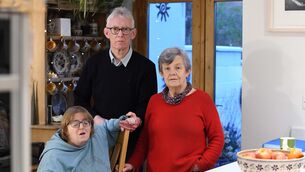Gerard Howlin: Sinn Féin, expecting opposition, is unprepared for government
Sinn Féin has patented the word ‘change’. But it can’t be delivered in the terms promised, writes
IN the by-election that elected a young Enda Kenny in 1975, then Taoiseach and Fine Gael leader, Liam Cosgrave, led him into Ballinrobe at night, their way lit by petrol-soaked sods of turf carried on pitchforks. The acolytes, as told in John Downing’s biography of Kenny, were the Fine Gael faithful.
It is not so much another era, in Leo Varadkar’s telling, as a forgotten past. His description of the Sinn Féin public meeting in Cork on Monday night as a “campaign of intimidation and bullying” was so hapless as to be funny. This is not Mussolini’s march on Rome, or even Cosgrave’s march on Ballinrobe. The soft seats and shining chandeliers at the Rochestown Park Hotel are tokens of Sinn Féin’s desire to sit in the parlour.
A shellshocked Fine Gael and Fianna Fáil are still incapable of reading the runes. Fine Gael, instantly, instinctively, retreated from the political field. Whether that froideur survives the threat of a second general election remains to be seen. As the votes were counted on February 9, Fianna Fáil leader Micheál Martin momentarily explored an exit from the anti-Sinn Féin box he had painted himself into, but opted to repaint his red lines instead.
The best that can be said of the situation is that a century after their origins crystallised, the two formerly big parties will forgo the reality of power for the semblance of office. It is unnecessary and pitiful.
It is not simply that Sinn Féin did much better than they expected. It is that they prepared for opposition and are unprepared for government. Their mantra and manifesto are both their platform and their millstone. They talked left, and chanted change. But the only plan in hand was to advance further towards government in coalition with a party of the establishment. It begs the question of who exactly is the establishment. But words matter and Sinn Féin got to the Scrabble set first.
Barely back from the brink of electoral setbacks of 2019, they have since performed politics better than their competitors. And since the general election 18 days ago, that difference has become more pronounced. There is a long history of public meetings in Irish politics. As claimants to Daniel O’Connell’s legacy, Fine Gael should remember that. Fianna Fáil dominated the church gates and crossroads for decades. I recall the rolling monster meetings of 1986 that launched the Progressive Democrats. In Galway’s Leisureland, the arrival of Bobby Molloy into the party was akin to the second coming of Cú Chulainn. In Trinity College, a meeting I had a hand in organising (in the largest lecture hall in the arts building) was so packed that the crowd backed up into the concourse and, for their safety, Des O’Malley and Mary Harney had to be escorted in through the Provost’s garden.
Fianna Fáil and Fine Gael are bereft because they have lost their sense of political theatre and they have lost control of the public space. This is to state the obvious. But every victory contains the seeds of its own undoing. This is especially so of Sinn Féin now. The public meetings, of which the first was on Monday, are intended to force open a door into government with the establishment. The scenario of a second election before the summer makes that more possible than it may seem. The meetings are to build momentum for Sinn Féin’s own base, too. But Sinn Féin is not a bottom-up grassroots movement. Its model is top-down, and command-and-control.
Its culture and structure is its first faultline. Its manifesto is another. Having brilliantly succeeded in defining what change should be, it seized for itself the mantle of change — which could as easily become its political shroud. Good at mobilising a structured organisation for attack, its rigidity freezes it into near immobility when under attack. It has proven poor at swimming in political waters it does not control. It wants to lead a mass movement, but has no tradition or culture of being accountable to one. In that it speaks for continuity in our culture, not for change.
The lesson of the Good Friday Agreement is that when Sinn Féin are accepted, they accept the institutions to which they have gained access. The salient point of their recent history is not what they stand for, but what they have jettisoned. That includes every principle they held previously. “Up the RA” is bawled in private, because the IRA, on its own terms, was betrayed and its mission abandoned. Business understands the malleability — let’s call it the practicality — of Sinn Féin. Rusting, second-rate political reflexes unable to swim in a new culture still have to catch up.
The process of government formation, should it succeed, is intended to leave them in command of the high ground of opposition. In scale, failure to bring Sinn Féin into government now will outstrip in stupidity Eamon Gilmore’s decision to bring Labour into government in 2011. Each bequeaths its own legacy. A now peripheral Labour Party is a fact. A much smaller Fianna Fáil will likely be the legacy of refusing to engage with the inevitable. Fine Gael, with less political overlap, has less risk.
Labour now has decided to mind itself. The Social Democrats agreed to consider going in with one, but not both, formerly big parties. But one of the “big” parties is not possible alone, not without Sinn Féin, so the Social democrats have effectively decided to opt-out. That leaves the Greens horribly exposed. Their choice now is to save themselves or save the planet.
All this sits in a different culture now. A generation isolating itself in cyberspace sees political meetings as a variation on a rave. There is a palpable need for mass belonging as an antidote to isolation. This is a life in which there is no respite. It is not that the political issue of the day is housing. It is that even at home (once the theatre of self), because of the always-on environment, there is hardly a distinction between home and work. We are increasingly angry, aggressive, and irrational. Sitting at a bar is no longer a place of chat. More likely, you are sitting in a row of typists conducting what substitutes for a social life.
Mostly Irish politics is still stuck in a late 20th century form, with great party organisations withered, but the architecture still lubricated by the booming economy and a covetous electorate.
The tide went out suddenly. Unattractive nakedness was exposed. Voters went elsewhere and there is no sign of them coming back. There are issues, certainly. More deeply, however, there is an angst. Sinn Féin has patented the word “change”. But it can’t be delivered in the terms promised. Arguably little of it relates to what is unsettling us anyway.













